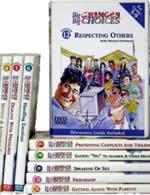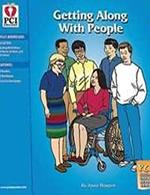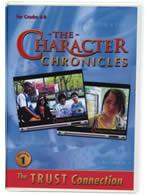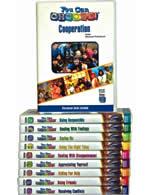You Can Choose DVD Series
This series serves as a powerful enhancement to any character education or life skills curriculum.You Can Choose! starts children on the path to positive, healthful life choices. This delightful videotape series teaches young people valuable lessons that contribute to self-discipline, good decision-making, high self-esteem, a sense of responsibility, and the ability to get along with others.Warm, humorous, and highly entertaining, You Can Choose! combines comedy, drama, music, peer-education,...
This series serves as a powerful enhancement to any character education or life skills curriculum.
You Can Choose! starts children on the path to positive, healthful life choices. This delightful videotape series teaches young people valuable lessons that contribute to self-discipline, good decision-making, high self-esteem, a sense of responsibility, and the ability to get along with others.
Warm, humorous, and highly entertaining, You Can Choose! combines comedy, drama, music, peer-education, and role modeling into a lively format that captivates and challenges young viewers. Each program in the series presents a compelling dramatic skit depicting a problem situation which is very real for children. While the skits are performed by a lovable cast of characters, the problems are ultimately resolved by the children, themselves.
Each DVD in the series is approximately 25 minutes in length. A facilitator's guide is included on each video which contains discussion questions, writing assignments, and follow-up activities that support the lesson.
Titles Include:
 You Can Choose: Cooperation
You Can Choose: Cooperation
Moose learns how to work in cooperation with others. When his insistence on always having his own way causes the breakup of his singing quartet, Moose discovers the benefits of cooperating, and learns what it takes to be a cooperative animal.

You Can Choose: Being Responsible
Being responsible does not come easily to Rhonda Bird, especially when she must choose between having a good time and taking her responsibilities seriously. When a chance to go to Disneyland conflicts with her commitment to work on a class project, Rhonda agonizes over what to do. In the end, she makes the responsible choice, winning the respect of her friends and making her feel very good about herself.
 You Can Choose: Dealing with Feelings
You Can Choose: Dealing with FeelingsTuggy Turtle discovers the importance of being honest about his emotions. In trying to hide his fears about going on a weekend camp out, Tuggy makes himself miserable and almost ruins his friendship with Moose. Then he learns that it's best to accept his feelings and express them honestly and positively.
 You Can Choose: Saying No
You Can Choose: Saying NoMissie Mouse has to choose whether to say no to a friend or do something she knows is wrong. When Missie's best friend, Rhonda, tries to pressure her into smoking cigarettes, Missie agonizes over her options before finding that there are ways to say no without ruffling Rhonda's feathers.
 You Can Choose: Doing the Right Thing
You Can Choose: Doing the Right ThingDoing the right thing often feels a lot better than doing whatever we think we can get away with. At least that's what Rhonda and Fiona discover when they find a lost wallet on the playground. The girls struggle with the temptation to spend the money before finally concluding that it's not theirs to spend. And when they see what it means to the person who lost it, they feel very good that they decided to do the right thing.
 You Can Choose: Dealing with Disappointment
You Can Choose: Dealing with Disappointment Missie Mouse must learn to keep perspective and deal with disappointment in a positive way. When her baseball team falls into last place, Missie almost gives up the sport before realizing that losing is not the same thing as being a loser.
 You Can Choose: Appreciating Yourself
You Can Choose: Appreciating YourselfTuggy learns that being himself is a lot better than pretending to be something he's not. When he becomes troubled by feelings of inadequacy, Tuggy starts making up stories until his friends help him to recognize and appreciate his own true wonderful qualities.
 You Can Choose: Asking for Help
You Can Choose: Asking for HelpMoose learns not to let pride or embarrassment get in the way of asking for help. After ruining a group science project, Moose finds that the only good way to cope with his "secret" reading problem is to get the help he needs to overcome it.
 You Can Choose: Being Friends
You Can Choose: Being FriendsBeing best friends isn't always easy. In this DVD, Rhonda, Missie, and Fiona learn about the complex nature of friendship. When Missie is not invited to the "in" party, the three girls sort out some important issues about friendship and deal with what it means to be left out.
 You Can Choose: Resolving Conflicts
You Can Choose: Resolving ConflictsTuggy and Rhonda learn that there are ways to resolve disagreements without fighting. When a dispute between them puts their class art project in jeopardy, Tuggy and Rhonda learn to work out interpersonal conflicts in a peaceful and positive way.
Item #
Products
Price
Wishlist
Qty
Requested quantity is not available at this time
LV2661WB
You Can Choose: Cooperation DVD
$59.99
Requested quantity is not available at this time
LV2662WB
You Can Choose: Being Responsible DVD
$59.99
Requested quantity is not available at this time
LV2663WB
You Can Choose: Dealing with Feelings DVD
$59.99
Requested quantity is not available at this time
LV2664WB
You Can Choose: Saying No DVD
$59.99
Requested quantity is not available at this time
LV2665WB
You Can Choose: Doing the Right Thing DVD
$59.99
Requested quantity is not available at this time
LV2666WB
You Can Choose: Dealing with Disappointment DVD
$59.99
Requested quantity is not available at this time
LV2667WB
You Can Choose: Appreciating Yourself DVD
$59.99
Requested quantity is not available at this time
LV2668WB
You Can Choose: Asking for Help DVD
$59.99
Requested quantity is not available at this time
LV2669WB
You Can Choose: Being Friends DVD
$59.99
Requested quantity is not available at this time
LV2670WB
You Can Choose: Resolving Conflicts DVD
$59.99
Requested quantity is not available at this time
LV2671WB
You Can Choose Complete Series (10 DVD's)
$550.00
Only the first 5 items are displayed. Click here to
See all items




